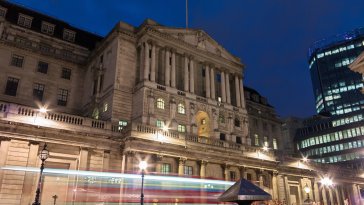
Take Two: European Central Bank and Bank of Canada cut interest rates
- 10 June 2024 (3 min read)
What do you need to know?
The European Central Bank (ECB) cut interest rates after nine months of holding steady, lowering its key benchmark rate by 25 basis points to 3.75%. It said the inflation outlook “has improved markedly” since last September when interest rates were at their peak. However, the ECB now expects inflation to average 2.5% in 2024 and 2.2% next year, up from its March forecast of 2.3% and 2.0% respectively. Elsewhere the Bank of Canada became the first of the G7 central banks to lower rates last week, by 25 basis points to 4.75% - its first cut in four years.
Around the world
US business activity rose at its fastest pace in over two years in May, driven by a rise in new orders, the latest S&P Global Purchasing Managers’ Index (PMI) showed. The composite, which includes both manufacturing and services, rose sharply to 54.5 from 51.3 in April. The US manufacturing PMI rose to 51.3 in May from 50.0, returning to growth, while the services index rose to a one-year high of 54.8 from 51.3 – a reading above 50 indicates expansion. Meanwhile, China’s Caixin composite PMI rose to 54.1 in May from 52.8, on the back of the fastest growth in manufacturing output in nearly two years.
Figure in focus: 80%
There is an 80% likelihood the annual average global temperature will temporarily exceed 1.5°C above pre-industrial levels for at least one of the next five years, according to a new World Meteorological Organization (WMO) report. It said that short-term warming does not equate to a permanent breach of the Paris Agreement goal, but that more needs to be urgently done to cut greenhouse gas emissions. Separately, the International Energy Agency said that countries’ renewable energy plans will only meet 70% of what is needed to meet the COP28 goal of tripling renewable power by 2030.
Words of wisdom
NIFTY 50: India’s benchmark stock market, which consists of the country’s 50 largest listed companies. The NIFTY 50 Index closed at a record high last Monday, ahead of India’s general election result in anticipation of a decisive victory by Prime Minister Narendra Modi’s nationalist ruling Bharatiya Janata Party (BJP). However, stocks fell sharply on Tuesday before recovering some ground later after Modi secured a third five-year term but without an outright majority for the first time since he came to power a decade ago. The result will likely make it more difficult for the government to push through reforms, given the BJP’s weaker mandate.
What’s coming up?
Monday sees Japan issue a final estimate for first quarter economic growth. On Tuesday, the UK publishes its latest unemployment data and follows with April’s GDP numbers on Wednesday. The same day will see the US Federal Reserve convene to set interest rates while the US, China and Germany release their respective inflation updates for May. The Bank of Japan holds its own monetary policy meeting on Friday.
Disclaimer
The information on this website is intended for investors domiciled in Switzerland.
AXA Investment Managers Switzerland Ltd (AXA IM) is not liable for unauthorised use of the website.
This website is for advertising and informational purpose only. The published information and expression of opinions are provided for personal use only. The information, data, figures, opinions, statements, analyses, forecasts, simulations, concepts and other data provided by AXA IM in this document are based on our knowledge and experience at the time of preparation and are subject to change without notice.
AXA IM excludes any warranty (explicit or implicit) for the accuracy, completeness and up-to-dateness of the published information and expressions of opinion. In particular, AXA IM is not obliged to remove information that is no longer up to date or to expressly mark it a such. To the extent that the data contained in this document originates from third parties, AXA IM is not responsible for the accuracy, completeness, up-to-dateness and appropriateness of such data, even if only such data is used that is deemed to be reliable.
The information on the website of AXA IM does not constitute a decision aid for economic, legal, tax or other advisory questions, nor may investment or other decisions be made solely on the basis of this information. Before any investment decision is made, detailed advice should be obtained that is geared to the client's situation.
Past performance or returns are neither a guarantee nor an indicator of the future performance or investment returns. The value and return on an investment is not guaranteed. It can rise and fall and investors may even incur a total loss.
AXA Investment Managers Switzerland Ltd.





